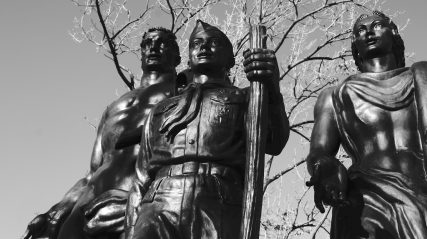(RNS) New Years Day marks the official start to the Boy Scouts of America (BSA) new policy on gay youth in scouting. Starting January 1, youth in the BSA may not be denied membership based solely on their sexual orientation. Adult leaders, however, may not be “open or avowed homosexuals.”
Churches and other religious organizations have a keen interest in the new policy. Seven out of ten BSA troops are hosted by religious groups. These troops are often viewed as youth ministry and an opportunity to develop character in a way consistent with the religious values of the religious organization. Some of these religious groups see the policy as the best step forward. Many others oppose the policy–some for going to far and others because it does not go far enough.
BSA policy is ‘just right’
For many churches, the BSA policy is inclusive without being too inclusive. For Catholics, Mormons, and other religious groups, the new policy allows youth to remain in the Boy Scouts regardless of orientation, but it holds the line on sexual morality and LGBT adult leadership.
The National Catholic Committee on Scouting sees the new policy as consistent with Catholic teaching, which recognizes sexual orientations but views any sexual conduct outside of (opposite-sex) marriage as immoral. The NCCS supports the new policy because it allows boys to remain in scouting without forcing Catholic programs to open their leadership to LGBT adults.
The policy is also fine with the Church of Jesus Christ of Latter Day Saints (LDS). The LDS church said that the policy will not affect troops supported in its wards. “Sexual orientation has not previously been—and is not now—a disqualifying factor for boys who want to join Latter-day Saint Scout troops,” said the church.
BSA went ‘too far’
Evangelical churches and other conservative religious groups object to the policy because they see it as opening the door for full integration of gays in the BSA. Leaders of conservative Christian groups said in a public letter that the new policy will “open the Scouts to a wide range of open sexual expressions.” Opponents included leaders of religious advocacy groups, conservative movements within mainline denominations, and prominent evangelical, pentecostal, or holiness denominations.
Some urged churches to support their alternatives to the scouts such as the Southern Baptist Royal Ambassadors or the Assemblies of God Royal Rangers.
Southern Baptists passed a resolution at their annual convention objecting to the BSA policy. The resolution affirmed those churches and families that could no longer support the BSA and encouraged those that were continuing the BSA to work for the reversal of policy and “to advocate against any future change in leadership and membership policy that normalizes sexual conduct opposed to the biblical standard.”
BSA is ‘not enough’
Other religious groups welcomed the change, but wanted the BSA to go further. The BSA policy does not allow LGBT adults to be involved in scouting. This includes LGBT parents of scouts.
Over 500 rabbis and cantors signed a statement from the Religious Action Center of Reform Judaism (RAC). The RAC supported the change for youth, but wanted full participation by LGBT adults. “We believe that each human being is created b’tselem elohim, in the image of God. That stamp of the divine does not change between childhood and adulthood. Indeed, LGBT adults can and do provide exemplary role models for both straight and gay youth,” said the RAC.
Among Christian churches, there was also support for more changes to the BSA. Some, like the United Church of Christ, supported the full inclusion of LGBT adults. The United Methodists preferred an alternative that would allow local congregations to make the choice for whether or not LGBT adults could be involved in scouting. There were also efforts by LGBT affirming movements within churches to support the new policy and push for further changes for adult leaders.






